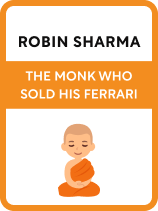

This article is an excerpt from the Shortform book guide to "The Monk Who Sold His Ferrari" by Robin Sharma. Shortform has the world's best summaries and analyses of books you should be reading.
Like this article? Sign up for a free trial here .
What is some daily inspiration from The Monk Who Sold His Ferrari? How can daily inspiration from The Monk Who Sold His Ferrari help guide your routine activities?
The Monk Who Sold His Ferrari is all about living a better life every day. Daily inspiration from The Monk Who Sold His Ferrari can help with this by focusing your attention on how you use your time.
Keep reading for some daily inspiration from The Monk Who Sold His Ferrari about time and how you use it.
The Watch and Daily Inspiration From The Monk Who Sold His Ferrari
The watch from Yogi Raman’s story symbolizes time. Specifically, the understanding that your time is limited and precious.
Those who use their time wisely and productively will have rich, full lives. No matter where you came from or what your current situation is, everyone has the same 24 hours a day to work with. Mastery of that time leads to mastery of your life.
John mentions that he once heard the busiest people are the ones with time to spare. Julian agrees, saying that the most productive people aren’t the workaholics, but the ones who manage their time well. Remember the Sages, who spend their days working with purpose and focus.
How to Manage Your Time
Daily inspiration from The Monk Who Sold His Ferrari reminds you to manage your time well. 80 percent of what you achieve comes from 20 percent of what you do. Think about all the things you do in a day, then think about which of those things will have a lasting impact on your life. Most likely you’ll only come up with a few things that actually matter in the long run.
Important activities might include connecting with friends and family, improving professional relationships, studying to expand your knowledge base, meditating and improving your inner life, and of course resting to heal your mind, body, and spirit. These are only examples. Find what will be important to you in the long run, and devote your time and energy to those things.
“Live each day like your last” may be an overused phrase, but there’s wisdom in it. If you were almost out of time, how would you spend what little you have left? No doubt you’d make the most of every moment, without any wasted time. This concept helps focus your mind on what’s most important to you.
Daily Inspiration From The Monk Who Sold His Ferrari: Planning Your Time
Rather than spend a stressful day scrambling to catch up on all the things you have to do, take 15 minutes the night before to plan your next day—or, better yet, an hour on your day off to plan your week. Figure out what you have to do professionally, personally, socially, and spiritually, and allot time for all of your daily tasks. Make a written schedule and stick to it. Procrastination is human nature. You’ll naturally want to avoid or put off unpleasant tasks. However, remember that the happiest people are the ones who will accept short-term discomfort for long-term benefits.
Start your day earlier if you find you’ll need the extra time. Focus on your priorities—not just work priorities, but life priorities. Your work and non-work lives aren’t separate things; they’re two parts of a whole and will affect each other, positively or negatively. Therefore, enriching your personal time is never a waste.
Also be wary of people who will try to steal your time. Protect your time ruthlessly. Don’t be afraid to tell people no when they try to intrude on time you’ve allotted for something else, even resting.
Daily Inspiration From The Monk Who Sold His Ferrari: Assume Failure Doesn’t Exist
We’ve previously discussed how failure is an excellent teacher. However, to make the most of your time and not waste any on doubts, you should act as if failure doesn’t even exist. Don’t set limits on yourself; let your imagination go where it will. Have no doubt in your mind that you’ll achieve all of your goals: professional, personal, and spiritual. Most of all, don’t be ashamed of your past, or afraid of your future.
After they finish discussing this lesson, John’s neighborhood is beginning to wake up. Julian, for the first time that night, is showing signs of tiredness. At this point they are almost to the end of Yogi Raman’s fable—only two lessons remain.
Helping Others
According to daily inspiration from The Monk Who Sold His FerrariThe roses that awaken the sumo wrestler in Raman’s fable represent service to others. They reference an old Chinese proverb, which says a bit of perfume will stay on the hand that gives away a rose. In other words, by being kind to others you’ll improve your own life as well.
Quality of life doesn’t come from a big home or a fast car. You had nothing when you were born, and—no matter how rich you become—you’ll have nothing after you die. Therefore, working only for yourself is pointless. True quality of life comes from what you give back, and the real reason for existence is to serve others. You are born crying while the world celebrates; you should die celebrating while the world cries. In other words, live a life that you’ll be happy with, and that others will be sad to lose.
How to Help Others
All of this doesn’t mean you have to give up your job or your possessions. While some people do choose to give up everything and devote their whole lives to serving others, and are quite happy doing it, that lifestyle isn’t required and it isn’t for everyone. However, you should see yourself as part of the world, not just an individual. Remember the story of the giant from Chapter 9: Doing good for others will cause good to come back to you.
Therefore, take some time each day to think about the good you can do for others. These can be very small things, like letting a car pass you during a traffic jam, or giving a compliment to someone who isn’t expecting it. Those small gestures will add up to increased happiness for yourself and those around you.
One of the best ways to do this is by helping your friends and keeping your relationships strong. Your friends, in turn, will enrich your own life. Friends make your good times better, and your bad times more bearable.

———End of Preview———
Like what you just read? Read the rest of the world's best book summary and analysis of Robin Sharma's "The Monk Who Sold His Ferrari" at Shortform .
Here's what you'll find in our full The Monk Who Sold His Ferrari summary :
- Why your career success might actually be killing you
- How to live a simple and fulfilling life
- The 10 rituals you should practice for health and healing






